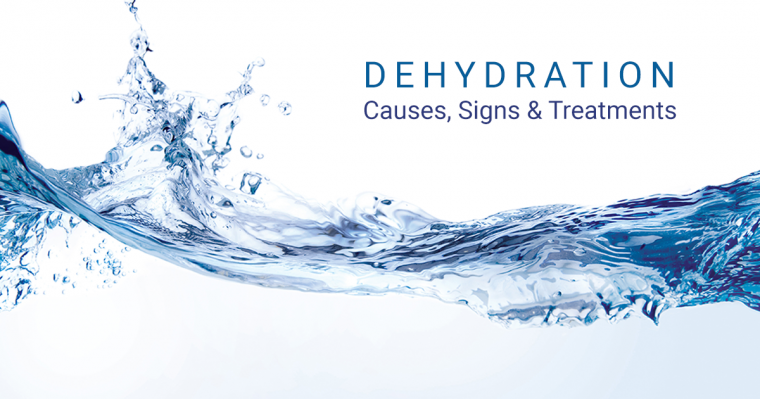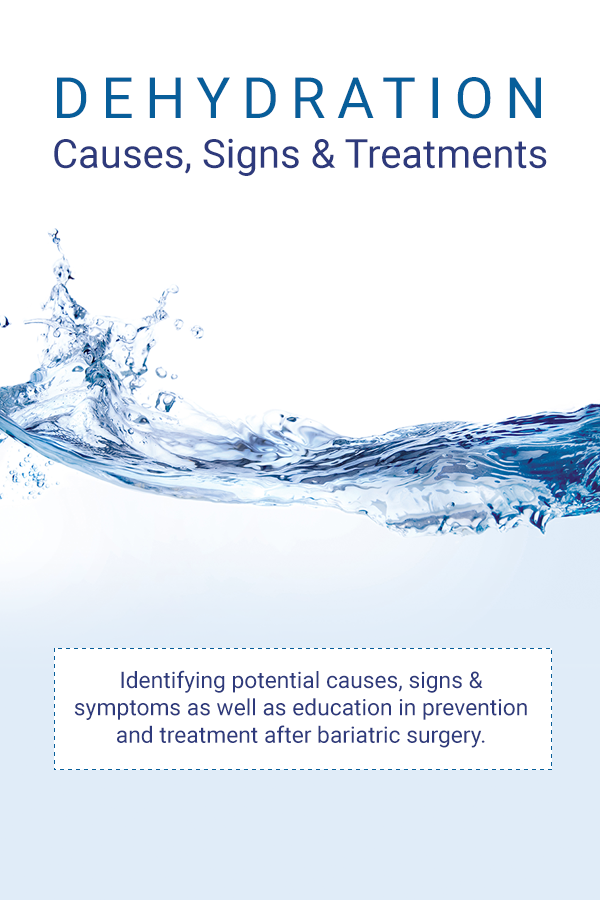
Dehydration After Bariatric Surgery: Causes, Signs, and Treatments
June 15, 2020One of the most preventable complications following bariatric surgery is dehydration. Identifying the potential causes, signs, and symptoms of dehydration after bariatric surgery, as well as providing early education in prevention and treatment are key factors in reducing one’s risk for this common problem.
Dehydration After Bariatric Surgery
Dehydration: Causes
The early postoperative period following bariatric surgery warrants the most concern for dehydration due to several factors. The reduced size of the gastric pouch limits the amount of fluid an individual can comfortably drink at one time.
Therefore, if an individual is not making a concerted effort to sip fluids throughout the day, dehydration can result fairly quickly. However, many patients also report that they struggle with nausea and taste changes, which may also impact the ability to drink enough fluids.
Unfortunately, dehydration may also exacerbate nausea, thus continuing the cycle and making it even more difficult to maintain adequate hydration. For those individuals having surgery in the warmer summer months that are not making an effort to drink plenty of fluids, the excess loss of body fluids through sweat can also increase the risk.
Additionally, other loss of body fluids, in the case of diarrhea or watery stools, particularly in individuals that have undergone some of the more malabsorptive procedures, such as the duodenal switch, are also at an increased risk.
The patient and healthcare provider should also consider the types of medications a patient may be taking, or have taken previously. Medications known to cause a loss of fluid include blood pressure medications, diuretics, and laxatives. These medications must be taken into account as many obese individuals generally suffer from one or more comorbidities, including hypertension, and adjustments are necessary in the early post-operative period.
Another important consideration is that constipation tends to be a common complaint following surgery. Many patients rely on the use of stool softeners and laxatives to relieve their symptoms and, unfortunately, may unintentionally take more than the recommended amount thus resulting in loose, watery stools.
However, other types of medication interactions that may increase the risk for dehydration could include those that decrease thirst sensation and those that alter central thermoregulation. Therefore, all patients should consult with their physician about the side effects of any medications they may be taking before and after bariatric surgery (1). The length of stay and early post-op complications may also increase the risk for dehydration within the first 30 days post-op (2).
Taking body weight into account, obese individuals also generally require more maintenance fluids than leaner individuals, but there are currently no accurate predictive equations to estimate fluid needs in the obese population (3).
Dehydration: Signs & Symptoms
Dehydration effects nearly every organ system of the body, so symptoms can be multifactorial and may progress relatively quickly. The most common early symptoms an individual might experience include feeling thirsty or having a dry mouth. Additional symptoms can include constipation, fatigue, dry skin, or decreased skin turgor. Additionally, a reduction in total urine output, as well as urine that tends to be darker than normal or foul smelling, could be additional signs of dehydration.
If not addressed, feeling lightheaded (especially when going from a seated to standing position) or having low blood pressure, and noticing an elevated body temperature are indicators of more severe dehydration. Frequent episodes of lightheadedness could increase the risk for falls and fainting which would warrant more immediate medical attention.
Dehydration: Treatments
The first and probably most obvious treatment for dehydration includes drinking some type of fluid. In the early post-op phase, taste changes and nausea may impact what or how much a person is able to comfortably consume. Therefore, an individual may want to focus on sugar-free flavored beverages, in addition to plain water, preferably those that also contain electrolytes such as sports drinks. Several patients also report that the temperature of fluids makes a difference, so trying warm broth or an herbal tea may also help to increase the consumption of fluids.
It is also possible to obtain some fluids from food, especially foods containing a higher water content such as soups and stews, sugar-free gelatin or popsicles, as well as fruits and vegetables. However, in the early post-op period, it is already difficult to tolerate large volumes of anything, especially large volumes of food. Liquids are generally a more reliable way to treat dehydration as they don’t promote as much satiety as food and are easier to consume over shorter periods of time.
When making an effort to rehydrate oneself, be sure to avoid too much caffeine and alcohol as they can have a diuretic effect and lead a loss of extra fluids. Alcohol can also lead to a loss of awareness and judgment, which may further increase one’s risk for dehydration. Most bariatric surgery centers suggest avoiding alcohol for the first 6 months to a year after surgery.
More moderate or severe cases of dehydration should seek out additional medical assistance and will likely require intravenous fluids for rehydration.
References
- Puga AM, Lopez-Oliva S, Trives C, Partearroyo T, Varela-Moreiras G. Effects of Drugs and Excipients on Hydration Status. Nutrients. 2019;11(3):669. Published 2019 Mar 20. doi:10.3390/nu11030669
- Ivanics T, Nasser H, Leonard-Murali S, Genaw J. Dehydration Risk Factors and Impact After Bariatric Surgery: an analysis using a national database. ASMBS SOARD. 2019;15(12):2066-2074. Published September 11, 2019. doi:10.1016/j.soard.2019.09.054
- Shikora SA, Kim JJ, Tarnoff ME. Nutrition and Gastrointestinal Complications of Bariatric Surgery. NCP. 2007;22(1):29-40. Published February 1, 2007. doi:10.1177/011542650702200129

 | ABOUT THE AUTHOR Michelle Bauche, MS, RDN, LD, CSOWM is a registered dietitian working for Missouri Bariatric Services in Columbia, Missouri. She is a certified specialist in Obesity and Weight Management and a member of the Weight Management Dietetic Practice Group through the Academy of Nutrition and Dietetics. Read more articles by Michelle! |



